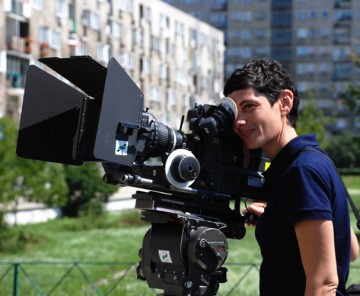“It’s not that I have concrete solutions to the problems … I’m constantly mirroring human conditions and political situations. Is it possible to create this reality or not, that is the question for me. All the time I’m playing with reality and fiction, constantly mirroring back and forth. It’s very ambivalent. You can read it as a solution, but for me it’s more a proposal and a questioning whether it’s possible to reverse history.” (“Interview: Yael Bartana,” Maria Kjaer Themsen, Kopenhagen.dk blog, 2010)
Yael Bartana creates photography, sound pieces, and installations in combination with her film and video practice.
Bartana was born in Israel and lives and works in Amsterdam and Tel Aviv. She was a recipient of the prestigious Artes Mundi prize in 2010, and it was recently announced that she’ll be at the upcoming 54th Venice Biennale, where she may run into another one of SAIC’s Visiting Artist Program’s guest speakers Lisa Freiman! Bartana will be representing Poland and screening selections from her And Europe Will Be Stunned series.
Yael Bartana, still from "Mur i Wieza," 2009. Shot on RED, HD video projection. Duration: 15’00”. Courtesy Annet Gelink Gallery Amsterdam
Bartana’s work is centered around the complex, multi-valiant issues of Zionism, anti-semitism, and nationalism, and she finds endlessly clever and moving ways to symbolically illustrate how those things impact the individual and inform their political identity. As she puts it, “…I also try to create discussions. My work becomes more and more political, and more and more disturbing — but also more complex.” (“Interview: Yael Bartana”)
Her work really resonates for me because it incorporates many of the familiar tropes of historical reenactment, propaganda, and documentary filmmaking, replete with severe camera angles, mellow-dramatic acting and bombastic musical scores. These simulations of ceremony and reconstructions of real and imagined pasts allow Bartana to cast a contemporary gloss over a re-interpretation of history. Again, in her own words, Bartana has remarked that:
“For me, as a visual artist, it’s really important to try to find ways that fiction can be used, like the idea of reversibility … So I try to make it playful and present different angles on the same thing. It’s a strategy that I have developed within the last few years; to take a specific thing and convert it, flip it, and see it from different perspectives.” (“Interview: Yael Bartana”)
If you’re in Chicago on March 10, be sure to catch her film screening at the Gene Siskel Film Center, where she’ll be on hand to illuminate and reflect on her work. (This program is sponsored in part by Conversations at the Edge and The Visiting Artists Program)
